When an individual acquires great power, the use or misuse of that power is everything. ~ Professor X in X-Men: The Last Stand
A mutant is an organism or genetic trait arising or resulting from an instance of mutation, a sequence change within the DNA of a gene or chromosome of an organism. The natural occurrence of genetic mutations is integral to the process of evolution. The word is also sometimes applied to forms of unexpected innovation in the arts.
Quotes
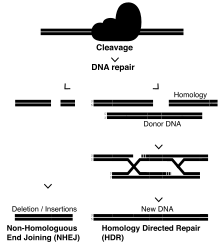
It is agreed that most, if not all, new mutations are deleterious. In plants, much fewer than 1% of radiation-induced mutants are found to be useful. In insects, a few induced mutations confer some advantage, but only to completely inbred populations - a situation quite in contrast with the human condition (NEWCOMBE 1960). ~ Paul de Bellefeuille
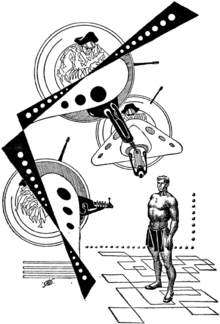
We'll know homo superior when he comes — by definition. He'll be the one we won't be able to euth. ~ Philip K. Dick
%2C_by_Th%C3%A9r%C3%A8se_Schwartze_(1851-1918).jpg)
According to Goldschmidt, all that evolution by the usual mutations—dubbed "micromutations"—can accomplish is to bring about "diversification strictly within species, usually, if not exclusively, for the sake of adaptation of the species to specific conditions within the area which it is able to occupy." New species, genera, and higher groups arise at once, by cataclysmic saltations—termed macromutations or systematic mutations—which bring about in one step a basic reconstruction of the whole organism. The role of natural selection in this process becomes "reduced to the simple alternative: immediate acceptance or rejection." A new form of life having been thus catapulted into being, the details of its structures and functions are subsequently adjusted by micromutation and selection. It is unnecessary to stress here that this theory virtually rejects evolution as this term is usually understood (to evolve means to unfold or to develop gradually), and that the systematic mutations it postulates have never been observed. It is possible to imagine a mutation so drastic that its product becomes a monster hurling itself beyond the confines of species, genus, family, or class. ~ Theodosius Dobzhansky
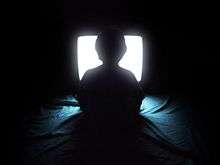
The young watch television twenty-four hours a day, they don't read and they rarely listen. This incessant bombardment of images has developed a hypertrophied eye condition that's turning them into a race of mutants ~ Federico Fellini
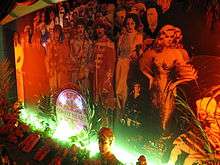
I declare that The Beatles are mutants. Prototypes of evolutionary agents sent by God… ~ Timothy Leary
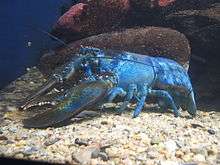
The time tested crowd favorite is a picture of a mutant lobster. They’re actually a lot more common than one might think ~ Chris Shorr
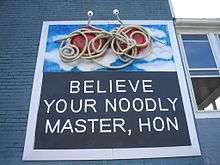
Wilson is a primary source for the ironic style of conspiracism, a sensibility that treats alleged cabals not as intrigues to be exposed or lies to be debunked but as a bizarre mutant mythos to be mined for laughs, metaphors, and social insights. ~ Jesse Walker

They wish to "cure" us. But I say to you we are the cure! The cure for that infirm, imperfect condition called "Homo sapiens!" They have their weapons... We have ours. We will strike with a vengeance and a fury that this world has never witnessed! ~ X-Men: The Last Stand
- It is agreed that most, if not all, new mutations are deleterious. In plants, much fewer than 1% of radiation-induced mutants are found to be useful. In insects, a few induced mutations confer some advantage, but only to completely inbred populations - a situation quite in contrast with the human condition (NEWCOMBE 1960). According to DOBZHANSKY (1957) : ‘if anything, radiation-induced mutants are more destructive than the spontaneous ones. As far as genetic effects are concerned, the only safe dose of high-energy radiation is no radiation’. As observed in mammals, mostly the mouse, the effects of radiation-induced mutations may be : (1) Dominant: lethals, seen as reduced litter size, or non-lethals, evidenced as offspring which are malformed or diminished in vitality or life-span; semi-sterility, resulting from translocation, is seen one generation later as a reduction of litters by one-half and is handed down to subsequent generations (PAULA HERTWIG 1940). (2) Recessive mutations are demonstrated by mating the offspring of exposed males to females known to be (heterozygous) carriers of certain traits (W. L. RUSSELL 1954; CARTER et coll. 1956). (3) Mutations involving sex-chromosomes may be reflected by a change in the sex ratio of the offspring (sex-linked lethals, see Fig. 1)
- Paul de Bellefeuille (1961), “Genetic Hazards of Radiation to Man”, ActaRadiologica, 56:1, p. 66
- In point of fact, as MULLER (1955) notes, the less harmful a mutant, the greater the number of individuals it affects, inasmuch as reproduction remains possible. Thus the total measure of mutational harm is the number of mutations produced, of whatever degree of harmfulness, rather than the damage to any one individual or generation. In a population which, like the human, is not inbred, the generation showing the greatest effect of a mutation should be the first filial one; but the total effect in the posterity, over an indefinite number of generations, is still greater (CROW 1958). This point shall be illustrated in relation to the foreseeable effects of radiation upon descendants of man (see Part 11).
- Paul de Bellefeuille (1961), “Genetic Hazards of Radiation to Man”, ActaRadiologica, 56:1, p. 67
- There are a number of studies that show radiation can cause heritable mutations in the offspring of irradiated organisms. These “germ-line mutations” have been shown to occur in unique sequences of DNA called “minisatellite loci”. The high frequencies of spontaneous and induced mutations at minisatellite loci allow mutation induction to be measured at low doses of exposure in a small population, making minisatellite mutation a powerful tool to investigate radiation-induced heritable mutations. However, the biological significance of these mutations is uncertain, and their relationship to health risk or population fitness is unknown. We have adopted this mutation assay to study the role of adaptive response in protecting mice against radiation-induced heritable defects. We have shown that male mice, adapted to radiation with a low dose priming exposure, do not pass on mutations to their offspring caused by a subsequent large radiation exposure to the adapted males.
- Boreham, DR; Dolling, J-A; Somers, C; Quinn, J; and Mitchel, REJ (2006) "THE ADAPTIVE RESPONSE AND PROTECTION AGAINST HERITABLE MUTATIONS AND FETAL MALFORMATION”, Dose-Response: An International Journal: Vol. 4 : Iss. 4 , Article 9.
- Lola the six-clawed lobster has escaped the fate that would face most of her kind, thanks to her genetic mutation, and will be served up in an exhibit case at the Maine Maine State Aquarium rather than on a dinner table.
- Two assumptions are commonly made in the estimation of genetic risk: (1) that the seven specific loci in the mouse constitute a suitable basis for extrapolation to genetic disease in humans, and (2) that mutations are induced by radiation damage (energy-loss events leading to double-stranded damage) occurring within the gene and are induced linearly with dose, at least at low doses. Recent evidence on the mutability of repeat sequences is reviewed that suggests that neither of these assumptions is as well founded as we like to think.
- Bryn A. Bridges, “Radiation and Germline Mutation at Repeat Sequences: Are We in the Middle of a Paradigm Shift?”, Radiation Research , Vol. 156, No. 5, Part 2 (Nov., 2001), pp. 631-641
- Last night I encountered a dream cat with a very long neck and a body like a human fetus, gray and transluscent. I don't know what it needs or how to provide for it. Another dream years ago of a human child with eyes on stalks. It is very small, but can walk and talk "Don't you want me?" Again, I don't know how to care for the child. But I am dedicated to protecting and nurturing him at any cost! It is the function of the Guardian to protect hybrids and mutants in the vulnerable stage of infancy.
- William S. Burroughs, in The Cat Inside (1986)
- When the frequency of a gene in the general population exceeds 1%, is not considered a random mutation but a mutation that has been positively selected during evolution.
- Cardo E, Nevot A, Redondo M, Melero A, de Azua B, García-De la Banda G, Servera M (March 2010). "Attention deficit disorder and hyperactivity: a pattern of evolution?", Revista de Neurologia (in Spanish). 50 Suppl 3: S143–7. PMID 20200842.
- It is possible that the presence of altered gene combinations, as in ADHD, can bring concrete benefits to society but are detrimental to the individual.
- Cardo E, Nevot A, Redondo M, Melero A, de Azua B, García-De la Banda G, Servera M (March 2010). "Attention deficit disorder and hyperactivity: a pattern of evolution?", Revista de Neurologia (in Spanish). 50 Suppl 3: S143–7. PMID 20200842.
- Charles Xavier's dream — where all Earth's children, mutant or otherwise, live together in peace and harmony! Where people are judged for who they are — not what they look like or how they're born. That's why he created the X-men, to exemplify that dream.
- Chris Claremont, in lines for Rachel Summers as Phoenix, in the first issue of Excalibur, Excalibur : The Sword is Drawn (1987), p. 45
- Mutants are all around us. They could be your neighbors. They could be your co-workers. They could be related to you. Gifted with extraordinary powers, they are the next step on the evolutionary ladder. Some use their powers for good; some, for unspeakable evil. One group had dedicated its wondrous abilities to protect mankind, even those who hate and fear them. Known to the world at large as outlaws, they are the X-Men.
- Chris Claremont, X-Men, The Dark Phoenix Saga, (1984) back cover.
- Unique events are unrepeatable and cannot be subjected to any sort of experimental investigation. … His general theory, that all life on earth had originated and evolved by a gradual successive accumulation of fortuitous mutations, is still, as it was in Darwin’s time, a highly speculative hypothesis entirely without direct factual support and very far from that self-evident axiom some of its more aggressive advocates would have us believe.
- Michael Denton, Evolution: A Theory in Crisis (1986) p. 69, 75, 77, 306, 358
- Here I am saying that mutants are dangerous to us ordinaries, a view which John W. Campbell, Jr. deplored. We were supposed to view them as our leaders. But I always felt uneasy as to how they would view us. I mean, maybe they wouldn't want to lead us. Maybe from their superevolved lofty level we wouldn't seem worth leading. Anyhow, even if they agreed to lead us, I felt uneasy as where we would wind up going. It might have something to do with buildings marked SHOWERS but which really weren't.
- Philip K. Dick, in story notes for The Golden Man (1953), in the short story anthology The Golden Man (1980)
- "We were always afraid a mutant with superior intellectual powers would come along," Baines said reflectively. "A deeve who would be to us what we are to the great apes. Something with a bulging cranium, telepathic ability, a perfect semantic system, ultimate powers of symbolization and calculation. A development along our own path. A better human being."
"He acts by reflex," Anita said wonderingly. She had the analysis and was sitting at one of the desks studying it intently. "Reflex — like a lion. A golden lion." She pushed the tape aside, a strange expression on her face. "The lion god."
"Beast," Wisdom corrected tartly. "Blond beast, you mean."
"He runs fast," Baines said, "and that's all. No tools. He doesn't build anything or utilize anything outside himself. He just stands and waits for the right opportunity and then he runs like hell."
"This is worse than anything we've anticipated," Wisdom said. His beefy face was lead-gray. He sagged like an old man, his blunt hands trembling and uncertain. "To be replaced by an animal! Something that runs and hides. Something without a language!" He spat savagely. "That's why they weren't able to communicate with it. We wondered what kind of semantic system it had. It hasn't got any! No more ability to talk and think than a — dog."- Philip K. Dick, in The Golden Man (1954)
- According to Goldschmidt, all that evolution by the usual mutations—dubbed "micromutations"—can accomplish is to bring about "diversification strictly within species, usually, if not exclusively, for the sake of adaptation of the species to specific conditions within the area which it is able to occupy." New species, genera, and higher groups arise at once, by cataclysmic saltations—termed macromutations or systematic mutations—which bring about in one step a basic reconstruction of the whole organism. The role of natural selection in this process becomes "reduced to the simple alternative: immediate acceptance or rejection." A new form of life having been thus catapulted into being, the details of its structures and functions are subsequently adjusted by micromutation and selection. It is unnecessary to stress here that this theory virtually rejects evolution as this term is usually understood (to evolve means to unfold or to develop gradually), and that the systematic mutations it postulates have never been observed. It is possible to imagine a mutation so drastic that its product becomes a monster hurling itself beyond the confines of species, genus, family, or class. But in what Goldschmidt has called the "hopeful monster" the harmonious system, which any organism must necessarily possess, must be transformed at once into a radically different, but still sufficiently coherent, system to enable the monster to survive. The assumption that such a prodigy may, however rarely, walk the earth overtaxes one's credulity, even though it may be right that the existence of life in the cosmos is in itself an extremely improbable event.
- Theodosius Dobzhansky, Genetics and the Origin of Species (1941) 2nd revised edition
- The young watch television twenty-four hours a day, they don't read and they rarely listen. This incessant bombardment of images has developed a hypertrophied eye condition that's turning them into a race of mutants.
- Federico Fellini, in I'm a Born Liar: A Fellini Lexicon (2003), "Younger Generation"
- We applaud the burgeoning emphasis on change in regulatory genes as the stuff of morphological evolution... if only because one of us had written a book to argue that the classical, and widely ignored data on evolution by heterochrony should be exhumed and valued as a primary demonstration of regulatory change. We do not see how point mutations in structural genes can lead, even by gradual accumulations, to new morphological designs. Regulatory changes in the timing of complex ontogenetic programs seem far more promising—and potentially rapid, in conformity with our punctuational predilections. The near identity of humans and chimps for structural genes, and the evidence of major regulatory change indicated by human neoteny provides an important confirmation.
- Stephen Jay Gould & Niles Eldredge, "Punctuated equilibria: the tempo and mode of evolution reconsidered," Paleobiology 6(1) (1977) pp. 115-151
- Mutation: it is the key to our evolution. It is how we have evolved from a single-celled organism into the dominant species on the planet. This process is slow, and normally taking thousands and thousands of years. But every few hundred millennia, evolution leaps forward.
- Introductory narration of Professor Charles Francis Xavier, in the X-Men (2000), written by David Hayter, Tom DeSanto and Bryan Singer
- Anything can happen. How absolutely true. You're exactly the mutant I'm looking for! You're hired.
- Zach Helm, in lines for "Mr. Magorium", who refers to an "accountant" he hires as a "mutant", in Mr. Magorium's Wonder Emporium (2007)
- Aside from inheriting half of the genome of each of our parents, we are born with a small number of novel mutations that occurred during gametogenesis and postzygotically. Recent genome and exome sequencing studies of parent–offspring trios have provided the first insights into the number and distribution of these de novo mutations in health and disease, pointing to risk factors that increase their number in the offspring. De novo mutations have been shown to be a major cause of severe early-onset genetic disorders such as intellectual disability, autism spectrum disorder, and other developmental diseases. In fact, the occurrence of novel mutations in each generation explains why these reproductively lethal disorders continue to occur in our population. Recent studies have also shown that de novo mutations are predominantly of paternal origin and that their number increases with advanced paternal age.
- Rocio Acuna-Hidalgo, Joris A. Veltman & Alexander Hoischen, [“New insights into the generation and role of de novo mutations in health and disease”] Genome Biology, volume 17, Article number: 241 (2016)
- What would you do with mutants who were just plain boys and girls and certainly not dangerous? You school them. You develop their skills. So I gave them a teacher, Professor X. Of course, it was the natural thing to do, instead of disorienting or alienating people who were different from us, I made the X-Men part of the human race, which they were. Possibly, radiation, if it is beneficial, may create mutants that’ll save us instead of doing us harm. I felt that if we train the mutants our way, they’ll help us - and not only help us, but achieve a measure of growth in their own sense. And so, we could all live together.
- Jack Kirby, "Conversations With The Comic Book Creators", Leonard Pitts, 1987, published in Kirby Effect: The Journal of the Kirby Museum, 6 August 2012.
- This was a period when we were experimenting with the atom bomb. People were wondering what the effects would be. Everybody worried ‘Would we all become mutants? We played around with this ‘mutation thing’ and I came up with the X-Men, who were associated with radiation and its effects on humanity.
- Jack Kirby, “1993: Jack Kirby: The Hardest Working Man in Comics by Steve Pastis”, Happening Magazine, (1993) by Steve Pastin; as quoted by Rand Hoppe, The Kirby Effect The Journal of the Jack Kirby Museum & Research Center, (28 April 2018).
- When an individual acquires great power, the use or misuse of that power is everything. Will it be used for the greater good or will it be used for personal or destructive ends? Now this is a question we must all ask ourselves. Why? Because we are mutants.
- Professor Charles Francis Xavier, in X-Men: The Last Stand (2006) written by Simon Kinberg and Zak Penn
- They wish to "cure" us. But I say to you we are the cure! The cure for that infirm, imperfect condition called "Homo sapiens!" They have their weapons... We have ours. We will strike with a vengeance and a fury that this world has never witnessed!
- Magneto, in X-Men: The Last Stand (2006) written by Simon Kinberg and Zak Penn
- It was things like the Teenage Mutant Ninja Turtles, he thought, that made you believe the world was maybe just as well off destroyed.
- Stephen King, in The Stand (1990 edition), Ch. 61, p. 934
- I'm either a mutant or a cripple, and I refuse to be a cripple. People pity cripples, but they're afraid of mutants … Fear implies respect.
- Dean Koontz, in One Door Away from Heaven (2001), Leilani Klonk, in Ch. 1, p. 4
- I declare that The Beatles are mutants. Prototypes of evolutionary agents sent by God, endowed with a mysterious power to create a new human species, a young race of laughing freemen.
- Timothy Leary, as quoted in Shout! (1981) by Philip Norman, p. 365; and in An Encyclopedia of Quotations about Music (1981) by Nat Shapiro, p. 303
- The X-Men, created by Jewish American comics legends Stan Lee and Jack Kirby in 1963, is a team of mutants, a class of human being first introduced as people that “possess an extrapower…one which ordinary humans do not!!” (EUX1 #1: 8ii). Especially after the introduction of the mutant-hunting robot Sentinels in X-Men #14 (Nov. 1965, EUX1), Marvel Comics’ mutants have been increasingly inscribed with allegorical Otherness. They have been subject to many of the prejudices that have historically plagued marginalized minorities, including, among other things, forced and voluntary segregation, slurs, persecution, and genocidal campaigns, and, conspiracy theories about their aims as a group.
- Martin Lund, "The Mutant Problem: X-Men, Confirmation Bias, and the Methodology of Comics and Identity", European Journal of American Studies, (Summer, 2015).
- It's 1987, do you know what your children are?
Paid for by citizens in support of the Mutant Registration Act.- Marvel Comics, November 1987.
- We conclude — unexpectedly — that there is little evidence for the neo-Darwinian view: its theoretical foundations and the experimental evidence supporting it are weak, and there is no doubt that mutations of large effect are sometimes important in adaptation. We hasten to add, however, that we are not "macromutationists" who believe that adaptations are nearly always based on major genes. The neo-Darwinian view could well be correct. … We hope to encourage evolutionists to reexamine this neglected question and to provide evidence to settle it.
- H. Allen Orr [Center for Population Biology, University of California, Davis], & Jerry A. Coyne [Department of Ecology and Evolution, University of Chicago], "The Genetics of Adaptation: A Reassessment," The American Naturalist, Vol. 140, No. 5 (November 1992), p. 726
- (The first sentence is sometimes quoted in isolation by creationists to suggest incorrectly that "there is little evidence" for evolution. In fact, the "neo-Darwinian view" under question is the relative importance of many small changes versus a few large changes.)
- But, be that as it may, is this variation, or variations, beneficial to humanity in their environment? According to Lois Gresh and Robert Weinberg, the X-men do have “helpful mutations..." This point is demonstrated numerous times in the adventures of the X-Men, where team members use their mutant powers to help them survive dangerous situations where normal humans would be killed instantly” (Gresh and Weinberg 2002, 135). What Gresh and Weinberg have overlooked, however, is that these “dangerous situations” came after the genetic variation, not before. Most of the battles the X-Men fight are either against other mutants-- such as Magneto and the Brotherhood of Evil Mutants, who have a more violent response to human oppression of mutants-- or against anti-mutant hate groups, such as the Sentinels or Friends of Humanity, whose only goal is to wipe out all mutants. All of these “dangerous situations” come up in response to the X-Men’s genetic variation, meaning that this variation cannot be an adaptive response to an environment. Of course, under the theory of evolution by natural selection, every mutation need not necessarily be useful.
- Jocelyn D. Pickreign, “Science Fiction and the Myth of Trajectory Evolution”, The Macalester Review, Vol. 3 [2013], Iss. 2, Art. 1, (6-2-2013), pp. 9.
- Family entertainment? Bollocks. What they want is filth: people doing things to each other with chainsaws during tupperware parties, babysitters being stabbed with knitting needles by gay presidential candidates, vigilante groups strangling chickens, armed bands of theatre critics exterminating mutant goats. Where's the fun in pictures? Oh, well, there we are. Here's the theme music. Goodnight.
- Monty Python, in The Meaning of Life, "The End of the Film"
- I'm telling you, with everything we know, about science, about the makeup of the human body, what happened in that classroom is impossible. That kid attracted an arc of electricity from thirty feet away, and not just from the Jacob's Ladder, I mean, after a second it was like it was coming out of the whole… building.
- Victor Salva, in Powder (1995); Donald Ripley about a mutant boy, Jeremy Reed (aka "Powder")
- We're stumbling around in a very dark age basically trying not to kill each other. So it hurts me when you say "So what?" Because you are not just different, Jeremy, I think you have a mind that we won't evolve to for like thousands of years — you're maybe the man of the future right here and now.
- Victor Salva, in Powder (1995); Donald Ripley to Jeremy Reed (aka "Powder")
- People love a nice shot of an orange sunrise over the islands in Casco Bay, of waves crashing on the rocks in front of Portland Head Light, or of seagulls fighting over rotten bait.
But the time tested crowd favorite is a picture of a mutant lobster.
They’re actually a lot more common than one might think, sometimes they come up with multiple claws, sometimes they’re different colors, and sometimes they’re so riddled with shell disease that they’re almost unrecognizable.
- There was a world of mutants, men and women who were more than normal men and women, persons who had certain human talents and certain human understandings which the normal men and women of the world had never known, or having known, could not utilize in their entirety, unable to use intelligently all the mighty powers which lay dormant in their brains.
- Clifford D. Simak, in Ring Around the Sun (1954)
- The people finally know.
They've been told about the mutants.
And they hated the mutants.
Of course, they hated them.
They hated them because the existence of the mutants makes them second-class humans, because they are Neanderthalers suddenly invaded by a bow and arrow people.- Clifford D. Simak, in Ring Around the Sun (1954)
- Robert Anton Wilson is the unacknowledged elephant in our cultural living room: a direct and indirect influence on popular books, movies, TV shows, music, games, comics, and commentary. … Wilson is a primary source for the ironic style of conspiracism, a sensibility that treats alleged cabals not as intrigues to be exposed or lies to be debunked but as a bizarre mutant mythos to be mined for laughs, metaphors, and social insights.
- Jesse Walker, in "Live From Chapel Perilous : We're living in Robert Anton Wilson's world" in Reason (December 2003)
- Of all creatures, only the Binder had bested the Lord of Hellwell. Then the gods had come to challenge his power. They had been puny in the early days, struggling to discipline their mutant powers with drugs, hypnosis, meditation, neurosurgery — forging them into Attributes — and across the ages, those powers had grown. Four of them had entered Hellwell, only four, and his legions had not been able to repel them.
- Roger Zelazny, in Lord of Light (1967)
Dialogue
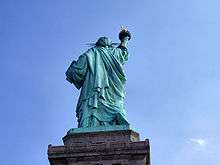
[T]here is no land of tolerance. There is no peace. Not here, nor anywhere else. Women, children, whole families destroyed simply because they were born different from those in power. Well, after tonight, the world's powerful will be just like us. They will return home as brothers. As mutants. Our cause will be theirs. ~ X-Men
- Senator Robert Kelly: I have here a list of names of identified mutants living right here in the United States.
- Dr. Jean Grey: Senator–
- Senator Kelly: Here's a girl in Illinois who can walk through walls. Now what's to stop her from walking into a bank vault, or the White House, or [gestures toward the gallery] into their houses?
- Dr. Jean Grey: Senator, please–
- Senator Kelly: And there are even rumors, Miss Grey, of mutants so powerful that they can enter our minds and control our thoughts, taking away our God-given free will. Now I think the American people deserve the right to decide if they want their children to be in school with mutants. To be taught by mutants! Ladies and gentlemen, the truth is that mutants are very real, and that they are among us. We must know who they are, and above all, what they can do!
- David Hayter, Tom DeSanto and Bryan Singer, X-Men, (2000).
- Magneto: I first saw her in 1949. America was going to be the land of tolerance. Of peace.
- Rogue: Are you gonna kill me?
- Magneto: (a pause) Yes.
- Rogue: Why?
- Magneto: Because there is no land of tolerance. There is no peace. Not here, nor anywhere else. Women, children, whole families destroyed simply because they were born different from those in power. Well, after tonight, the world's powerful will be just like us. They will return home as brothers. As mutants. Our cause will be theirs. Your sacrifice will mean our survival. I'll understand if that comes as small consolation.
- David Hayter, Tom DeSanto and Bryan Singer, X-Men (2000).
External links
This article is issued from
Wikiquote.
The text is licensed under Creative
Commons - Attribution - Sharealike.
Additional terms may apply for the media files.
